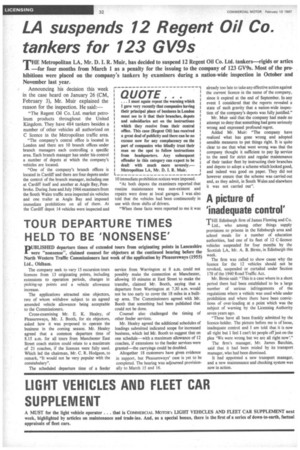LA suspends 12 Regent Oil Co.
Page 34

If you've noticed an error in this article please click here to report it so we can fix it.
tankers for 123 GV9s
T1E Metropolitan LA, Mr. D. I. R. Muir, has decided to suspend 12 Regent Oil Co. Ltd. tankers—rigids or artics —for four months from March 1 as a penalty for the issuing to the company of 123 GV9s. Most of the prohibitions were placed on the company's tankers by examiners during a nation-wide inspection in October and November last year.
Announcing his decision this week in the case heard on January 26 (CM, February 3), Mr. Muir explained the reason for the inspection. He said:—
"The Regent Oil Co. Ltd. market petroleum products throughout the United Kingdom. They have 484 tankers besides a number of other vehicles all authorized on C licence in the Metropolitan traffic area.
"The company's central office is located in London and there are 10 branch offices under branch managers each controlling a specific area. Each branch manager has under his control a number of depots at which the company's vehicles are located.
"One of the company's branch offices is located in Cardiff and there are four depots under the control of the branch manager, including one at Cardiff itself and another at Angle Bay, Pembroke. During June and July 1966 examiners from the South Wales traffic area inspected six vehicles and one trailer at Angle Bay and imposed immediate prohibitions on all of them. At the Cardiff depot 14 vehicles were inspected and
10 immediate prohibition notices were imposed.
"At both depots the examiners reported that routine maintenance was non-existent and repairs were done at local garages. I was also told that the vehicles had been continuously in use with three shifts of drivers.
"When these facts were reported to me it was already too late to take any effective action against the current licence in the name of the company, since it expired at the end of September. In any event I considered that the reports revealed a state of such gravity that a nation-wide inspection of the company's depots was fully justified."
Mr. Muir said that the company had made no attempt to deny that something had gone seriously wrong and expressed profound regret.
Added Mr. Muir: "The company have realized what has gone wrong and adopted sensible measures to put things right. It is quite clear to me that what went wrong was that the company thought it sufficient to pay lip service to the need for strict and regular maintenance of their tanker fleet by instructing their branches and depots to adopt a scheme which looked good, and indeed was good on paper. They did not however ensure that the scheme was carried out and, as they admit, in South Wales and elsewhere it was not carried out".












































































































